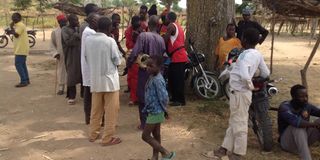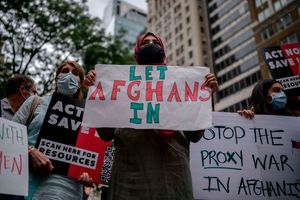
A group of Internally Displaced Persons dance in the Zamai resettlement camp in Far North Cameroon. The Boko Haram insurgency has displaced thousands in the Lake Chad Basin.
Lake Chad was once a 'watering hole' for Nigeria, Chad, Niger and Cameroon. Now this basin has become a source of refugees; people fleeing violence, erratic climate or just looking for a better place to live.
However, most of these teeming masses of forced migrants usually flee into each other's backyards. Consider Cameroon, which has been facing an insurgency in the English-speaking regions of the Northwest since 2017. Thousands of its civilians have fled to Nigeria, only for Nigerians to flee to Cameroon to escape Boko Haram militants.
The picture is horrendous for all the countries of the Lake Chad Basin. In Cameroon, there are 486,347 refugees and asylum seekers, according to the UN refugee agency (UNHCR). In total, the country has 2 million people from neighbouring countries. Yet it already has more than a million people internally displaced by its own conflicts.
According to UNHCR, Cameroon received an additional 12,000 Nigerian refugees and asylum seekers in 2023 as a result of violent extremism that has driven millions of people into Cameroon, Chad and Niger and displaced the rest within Nigeria itself. Nigeria hosts 85,000 refugees, of which 78,000 are from Cameroon, according to official data.
Chad, another Basin country, hosts 580,000 refugees, mostly from neighbouring Sudan, the Central African Republic and Cameroon. In total, the UNHCR says Chad has more than a million people technically displaced from their homes in the region, even if they're not all in refugee camps.
Violent attacks
The Lake Chad Basin is the centre of a regional force authorised by the African Union, known as the Multinational Joint Task Force (MNJTF).
In operation since 2015, the MNJTF has helped reduce violent attacks on civilians by militants such as Boko Haram and the al-Qaeda in West Africa Province group. It has also facilitated stabilisation programmes in the Lake Chad region and led humanitarian operations.

Women displaced by Boko Haram talk with Princess Sarah Zeid of Jordan (in cap), WFP Senior Special Adviser on Maternal, Newborn and Child Health and Nutrition, at a resettlement camp in Zamai, near Minawao, in Cameroon's Far North.
But its mandate has always been to track down violent extremists, leaving unattended problems caused by internal strife, as in Cameroon, or coups, as in Chad and Niger.
In fact, when the coup broke out in Niger, the focus of the MNJTF appeared to be weakened as Niger turned inward and relations with neighbouring Nigeria cooled over regional sanctions imposed on Niamey.
But insecurity isn't the main driver of displacement here. The dire humanitarian situation in the Lake Chad Basin region is being fuelled by climate change. Intercommunal clashes over shrinking water resources, land and food have also led to an increase in forced displacement across the region.
In late 2021, for example, 11,000 Cameroonians fled to Chad following tensions between farming, fishing and herding communities over climate-related resource scarcity.
They arrived in neighbouring Chad over the weekend, humanitarian organisations said.
Together with insecurity, these factors have displaced 3 million people and left 11 million in need of humanitarian assistance across the Lake Chad Basin, according to the United Nations.
Sought protection
The UNHCR said in a statement on December 21, 2023, that new arrivals from Nigeria registered at the Gourenguel Transit Centre have sought protection and assistance at the nearby Minawao Refugee Camp in the Fra North region of Cameroon.
Originally designed to accommodate 15,000 refugees, the camp's population has more than tripled in a decade and is now home to over 70,000 Nigerians who have fled violent attacks by Boko Haram in their home country. Nearing saturation, the camp is now experiencing a hidden emergency with the new arrivals, according to the UNHCR.
Olivier Guillaume Beer, UNHCR Representative in Cameroon, says the new arrivals will further strain the capacity of the overcrowded camp. Beer said on December 21 that talks were underway with the Cameroonian authorities to find alternative solutions, including a repatriation process for those who wish to return.
For more than a decade, attacks by Boko Haram and the Islamic State West Africa Province (ISWAP) have destabilised the Lake Chad Basin region. After several years of violence in northeastern Nigeria, in 2014 the groups expanded their insurgency into the Far North region of Cameroon, western Chad and southeastern Niger.
According to UNHCR figures, the number of Nigerians seeking refuge in other Lake Chad Basin countries as a result of violence in their home country reached 327,004 in July this year, with 189,245 in Niger, 20,053 in Chad and 116,706 in Cameroon.
The majority of displaced people have found refuge in already affected communities, putting further pressure on scarce local resources and overstretched infrastructure as humanitarian funding shrinks.
"'While the number of displaced people is increasing, humanitarian funding is sadly shrinking,' Beer said at the press conference.
The UNHCR Cameroon Multi-Country Office says it deals with refugees, asylum seekers and other forcibly displaced people from Cameroon, Gabon and Equatorial Guinea. Its budget is $142.8 million, according to the institution's fact sheet, which also says that by the end of October, only 27 per cent had been raised.
UNHCR has facilitated and will continue to facilitate the repatriation of refugees who wish to return to their home countries.
"We also have refugees who want to return even though the [security] situation is not completely stable... About 14,000 Nigerian refugees want to return," Beer said. He said that "even though people describe the north [eastern] part of Nigeria as hell on earth, the situation is better now than it was a few years ago".
The UNHCR Cameroon Representative said the UN refugee agency does not encourage or promote the return of refugees, but does not stop those who have expressed a desire to do so.
Humanitarian aid
The UN Office for the Coordination of Humanitarian Affairs (UNOCHA) estimates that $2.5 billion is needed for humanitarian aid alone. Yet only $500 million was pledged at the Third High-Level Conference on the Lake Chad Basin in Niamey, Niger, in January. The conference brought together governments from the affected countries, international donors, multilateral and international organisations, and civil society actors.
The cost of rebuilding communities and restoring the social contract between local authorities and communities is even higher.
The humanitarian situation in the countries of the Lake Chad Basin is just one of several dire humanitarian emergencies caused by forced displacement across the continent.
Last year, an additional 3.2 million Africans were forcibly displaced, bringing the total number of people forcibly displaced, largely due to conflict, to more than 40.4 million, according to a report by the Africa Center for Strategic Studies. This is more than the populations of Angola, Ghana or Morocco.
Sudan, Somalia, DR Congo, Nigeria, Burkina Faso and Ethiopia top the list of countries with the largest increases in the number of forcibly displaced people over the past year. They account for 64 per cent of the continent's total displacement.
Until political actors and stakeholders find a durable solution, new arrivals, such as the 12,000 Nigerians who arrived in Cameroon this year, will continue to be registered across regions.

